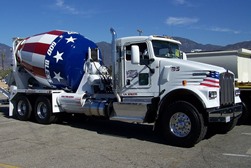How to Pick the Best Trucker Classes near Ontario California
 Congratulations on your decision to become a trucker and enroll in a trucking school near Ontario CA. Maybe it has always been your dream to hit the open road while driving a monster tractor trailer. Or possibly you have conducted some analysis and have discovered that an occupation as a truck driver provides excellent income and flexible work opportunities. Regardless of what your reason is, it's essential to obtain the proper training by picking the right CDL school in your area. When evaluating your options, there are certain variables that you'll need to examine before making your final choice. Location will no doubt be important, especially if you need to commute from your Ontario residence. The expense will also be important, but selecting a school based exclusively on price is not the best method to make certain you'll get the proper education. Don't forget, your objective is to master the knowledge and skills that will allow you to pass the CDL examinations and become a professional truck driver. So keeping that goal in mind, just how do you select a truck driving school? That is what we are going to address in the balance of this article. But first, we are going to talk a little bit about which commercial driver's license you will eventually need.
Congratulations on your decision to become a trucker and enroll in a trucking school near Ontario CA. Maybe it has always been your dream to hit the open road while driving a monster tractor trailer. Or possibly you have conducted some analysis and have discovered that an occupation as a truck driver provides excellent income and flexible work opportunities. Regardless of what your reason is, it's essential to obtain the proper training by picking the right CDL school in your area. When evaluating your options, there are certain variables that you'll need to examine before making your final choice. Location will no doubt be important, especially if you need to commute from your Ontario residence. The expense will also be important, but selecting a school based exclusively on price is not the best method to make certain you'll get the proper education. Don't forget, your objective is to master the knowledge and skills that will allow you to pass the CDL examinations and become a professional truck driver. So keeping that goal in mind, just how do you select a truck driving school? That is what we are going to address in the balance of this article. But first, we are going to talk a little bit about which commercial driver's license you will eventually need.
Which CDL Is Required?

To drive commercial vehicles legally within the United States and Ontario CA, a driver needs to attain a CDL (Commercial Driver's License). The 3 classes of licenses that a driver can apply for are Class A, Class B and Class C. Given that the subject of this article is how to select a truck driver school, we will highlight Class A and Class B licenses. What distinguishes each class of CDL is the type of vehicle that the driver can operate as well as the GVWR (Gross Vehicle Weight Rating) or GCWR (Gross Combination Weight Rating). Below are brief summaries of the two classes.
Class A CDL. A Class A Commercial Drivers License is required to drive any vehicle that has a GCWR of more than 26,000 lbs., including a towed vehicle of greater than 10,000 lbs. Some of the vehicles that drivers may be able to operate with Class A licenses are:
- Interstate or Intrastate Tractor Trailers
- Trucks with Double or Triple Trailers
- Tanker Trucks
- Livestock Carriers
- Class B and Class C Vehicles
Class B CDL. A Class B Commercial Drivers License is required to operate single vehicles having a GVWR of greater than 26,000 lbs., or a GCWR of greater than 26,000 lbs. including a towed vehicle weighing up to 10,000 lbs. Several of the vehicles that operators may be qualified to drive with Class B licenses are:
- Tractor Trailers
- Dump Trucks
- Cement Mixers
- Large Buses
- Class C Vehicles
Both Class A and Class B CDLs may also require endorsements to operate certain types of vehicles, for instance school or passenger buses. And a Class A license holder, with the proper needed endorsements, may drive any vehicle that a Class B licensee is authorized to operate.
How to Assess a Trucking School

Once you have determined which CDL you want to obtain, you can start the undertaking of researching the Ontario CA truck driving schools that you are considering. As previously discussed, location and cost will certainly be your initial considerations. But it can't be emphasized enough that they must not be your only considerations. Other issues, for example the reputations of the schools or the experience of the instructors are equally if not more important. So below are several more things that you need to research while carrying out your due diligence prior to choosing, and particularly paying for, your truck driving training.
Are the Schools Certified or Accredited ? Not many truck driver schools in the Ontario CA area are accredited due to the demanding process and cost to the schools. However, certification is more typical and is provided by the Professional Truck Driver Institute (PTDI). A school is not required to become certified, but there are certain advantages. Interested students recognize that the training will be of the highest caliber, and that they will be given plenty of driving time. As an example, PTDI requires 44 hours of real driving time, not ride-alongs or simulations. So if a school's program is certified (the program, not the school is certified), students know that the training and curriculum will measure up to the very high standards set by PTDI.
How Long in Business? One indicator to help measure the quality of a trucking school is how long it has been in business. A negatively rated or a fly by night school usually will not stay in business very long, so longevity is a plus. Having said that, even the top Ontario CA schools had to begin from their opening day of training, so use it as one of multiple qualifiers. You can also find out what the school's history is regarding successful licensing and employment of its graduating students. If a school won't share those stats, look elsewhere. The schools should also have associations with local and national trucking companies. Having a large number of contacts not only points to a superior reputation within the trade, but also boosts their job assistance program for graduates. It also wouldn't be a bad idea to get in touch with the California licensing department to confirm that the CDL trucking schools you are researching are in compliance.
How Good is the Training? As a minimum requirement, the schools must be licensed in California and employ instructors that are trained and experienced. We will discuss more about the teachers in the next segment. In addition, the student to instructor proportion should be no higher than 4 to 1. If it's any higher, then students will not be obtaining the individual instruction they will need. This is especially true concerning the one-on-one instruction for behind the wheel training. And watch out for any school that professes it can teach you to drive trucks in a comparatively short time period. Training to be an operator and to drive a tractor trailer skillfully takes time. The majority of Ontario CA schools provide training programs that run from 3 weeks to as long as two months, depending on the class of license or type of vehicle.
How Good are the Instructors? As already stated, it's important that the instructors are qualified to teach driving methods and experienced as both instructors and drivers. Although several states have minimum driving time prerequisites to qualify as an instructor, the more professional driving experience an instructor has the better. It's also crucial that the teachers keep current with industry developments or any new laws or changes in regulations. Assessing instructors may be a bit more subjective than other standards, and perhaps the best approach is to pay a visit to the school and speak with the teachers face to face. You can also talk to a few of the students going through the training and ask if they are happy with the quality of instruction and the teacher's qualification to train them.
Plenty of Driving Time? Above all else, a great trucking school will provide lots of driving time to its students. After all, isn't that what it's all about? Driving time is the real time spent behind the wheel driving a truck. Even though the use of ride-a-longs with other students and simulators are essential training methods, they are no alternative for real driving. The more instruction that a student receives behind the wheel, the better driver she or he will be. Although driving time differs among schools, a reasonable benchmark is 32 hours at a minimum. If the school is PTDI certified, it will provide at least 44 hours of driving time. Contact the Ontario CA schools you are looking at and ask how much driving time they furnish.
Are they Independent or Captive ? You can obtain discounted or even free training from some truck driver schools if you enter into an agreement to drive for a specific carrier for a defined period of time. This is called contract training, and the schools that offer it are called captives. So instead of having relationships with many different trucking lines that they can place their graduates with, captives only work with one company. The tradeoff is receiving less expensive or even free training by giving up the flexibility to initially work wherever you choose. Naturally contract training has the potential to reduce your income opportunities when beginning your new career. But for some it may be the best way to receive affordable training. Just make sure to inquire if the Ontario CA schools you are considering are independent or captive so that you can make an informed decision.
Provide CDL Testing Onsite? There are some states that will permit third party CDL testing onsite of trucking schools for its grads. If onsite testing is allowed in California, ask if the schools you are looking at are DMV certified to offer it. One benefit is that it is more convenient than competing with graduates of competing schools for test times at California testing locations. It is also an indicator that the DMV believes the authorized schools to be of a higher quality.
Are the Classes Accessible? As formerly mentioned, truck driver training is only about one to two months in length. With such a brief duration, it's essential that the Ontario CA school you enroll in offers flexibility for both the scheduling of classes and the curriculum. As an example, if you're having difficulty learning a particular driving maneuver, then the instructor should be prepared to spend more time with you until you are proficient. And if you're still employed while going to training, then the class scheduling needs to be flexible enough to accommodate working hours or other commitments.
Is Job Assistance Provided? The moment you have attained your CDL license after graduating from truck driving school, you will be eager to start your new career. Verify that the schools you are reviewing have job placement programs. Find out what their job placement percentage is and what average salary their grads start at. Also, ask which national and local trucking firms their graduates are referred to for hiring. If a school has a low job placement rate or not many Ontario CA employers recruiting their grads, it may be a sign to search elsewhere.
Is Financial Assistance Offered? Trucking schools are much like colleges and other Ontario CA area vocational or trade schools when it comes to loans and other forms of financial assistance being offered. Ask if the schools you are evaluating have a financial assistance department, or at a minimum someone who can help you understand the options and forms that must be submitted.
Learn More About Ontario Truck Driver Schools
Select the Right Ontario CA CDL Training
Picking the ideal truck driving school is an important first step to launching your new profession as a long distance or local truck driver. The skill sets that you will learn at school will be those that mold a new career behind the wheel. There are several options available and understanding them is vital if you are going to succeed as an operator. But first and foremost, you must get the proper training in order to drive a big commercial vehicle in a safe and professional fashion. If you are short on money or financing, you might want to think about a captive school. You will pay a reduced or even no tuition by agreeing to drive for their contracted carrier. Or you can choose an independent CDL school and have the the freedom to drive for the trucking firm of your choosing, or one of several associated with the school. It's your decision. But no matter how you get your training, you will soon be joining an industry that helps America move as a professional trucker in Ontario CA.
